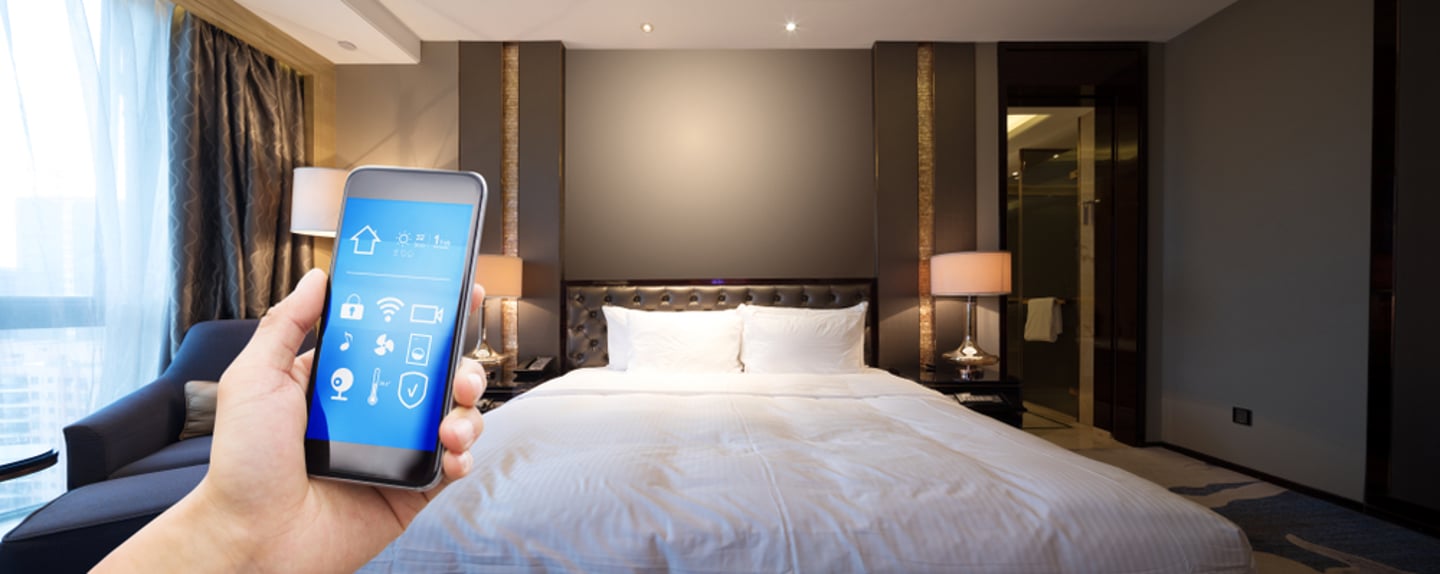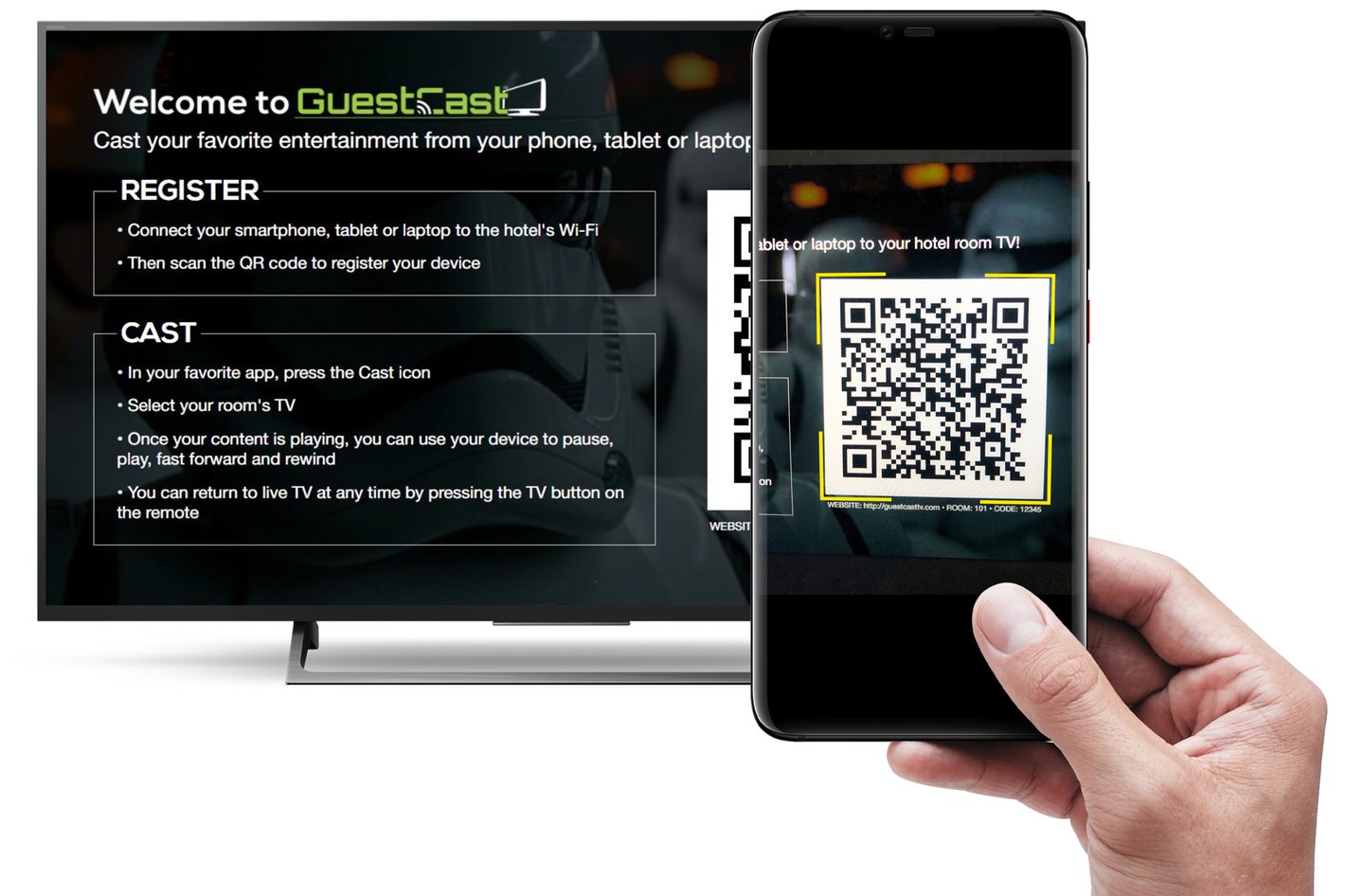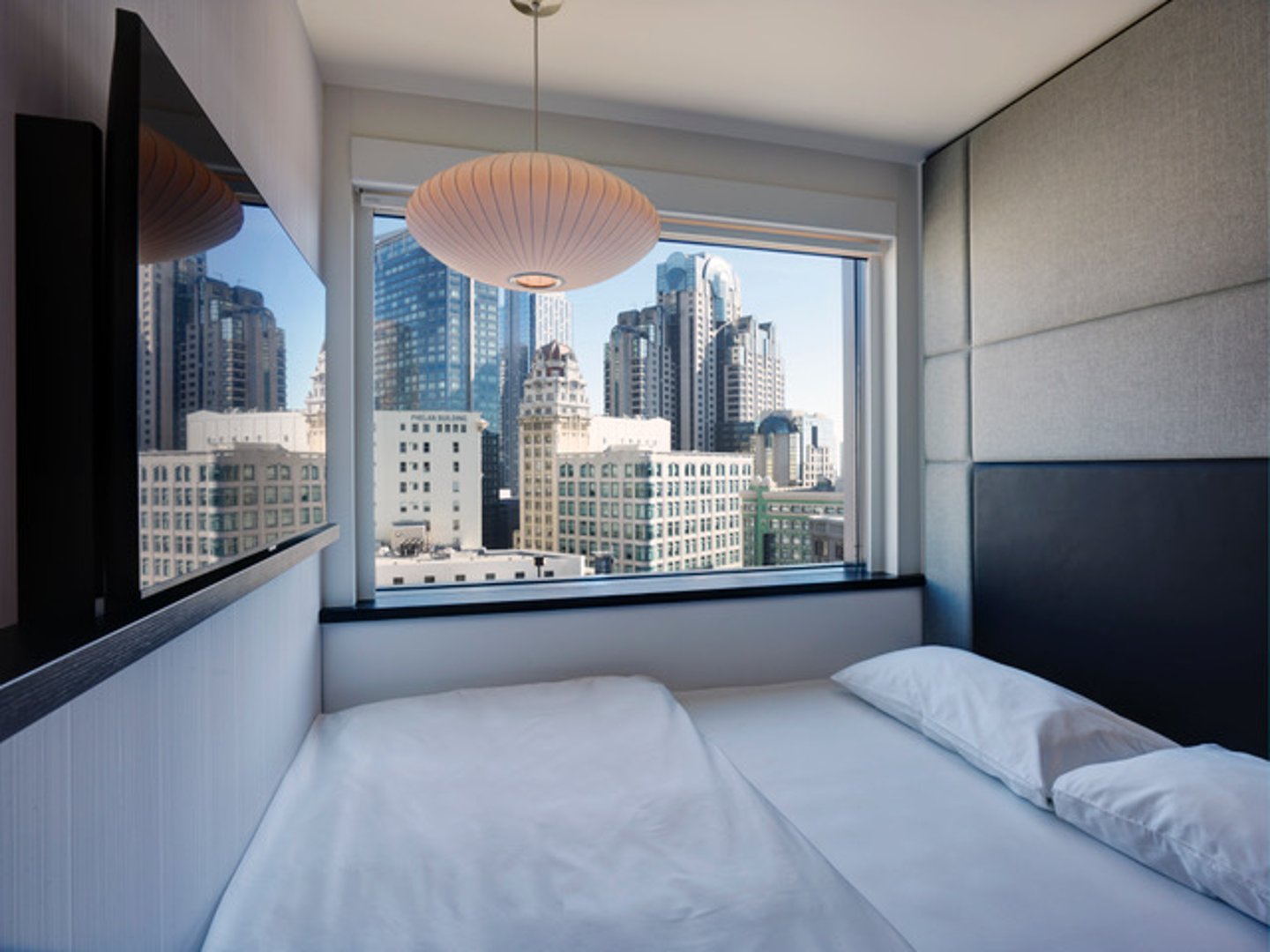The 2022 Guest Room Experience: What a Guest Wants, What a Hotel Needs
In Hospitality Technology’s 2021 Customer Engagement Technology Study, HT polled consumers and found that hotel guests want their guest room to have specific technological components. For example, while no one can live without free and fast Wi-Fi these days, 55 percent of consumers also reported that they wanted smart TVs or content streaming technologies within the guest room, 34 percent want the ability to control the TV, lights, thermostat and other in-room amenities via an app on their mobile phone, and 31 percent of consumers said they’d want a voice-controlled device in the guest room. Thus, it may come as no surprise to readers that in HT’s 2022 Lodging Technology Study, 45 percent of hoteliers reported that enhancing guest room technology in 2022 will be a very or extremely important initiative.
To find out how the guest room of the future might evolve in 2022 and what a hotel stay might look like in the near future, HT spoke both with hoteliers and industry experts. Here’s what they have to say.
MUST HAVE: FAST, RELIABLE INTERNET
When it comes to guest room technologies, guests want fast, reliable internet more than anything. In fact, consumer respondents to HT’s 2021 Customer Engagement Technology Study ranked free Wi-Fi – which we can assume includes high speed and reliable characteristics – as being more important to them than even positive consumer reviews/high ratings on third-party booking websites. And for good reason. The internet has become so integrated with our daily lives that most consumers cannot function without it. For example, a business traveler now requires high amounts of bandwidth for video conference calls during the day and large amounts of bandwidth for streaming movies, games and music at night.
Hotels that aren’t able to provide the internet network needs that modern day consumers require will find that they’re missing out on a significant amount of revenue, says Grant Harland, Retail Industry Analyst, Windstream. Consider this, poor internet connectivity will cause complaints, erode loyalty, and could, in some cases, even compel the guest to leave the property immediately.
Paul Andrew, General Manager at Shepard’s Beach Resort in Clearwater Beach, Fla., knows all too well how important it is to provide guests with a strong internet connection.
“Unfortunately, back in 2016, we were experiencing many guest complaints because our internet was slow and inconsistent,” Andrew explains. “We opened a new addition to the Resort, but our Wi-Fi service didn't match the quality of our new property. Our guests deserved better, so we contracted with Hotel Internet Service. This was the best move we made towards excellent customer relations. Our repeat guests noticed the difference immediately. Now, the only question we get about our Wi-Fi is the password.”
As hotels move toward incorporating more IoT devices within the room, low or inconsistent internet quality will cause them to become slow to respond or perhaps entirely unavailable, says Gary Patrick, CEO of Hotel Internet Services.
“What should have been a more convenient and enjoyable service option now simply represents a cause of aggravation for guests, defeating the purpose of adopting smart technologies in the first place,” Patrick adds.
But offering fast and reliable internet is not enough. Hotels must also ensure that guests can connect to it quickly and with the least amount of friction possible, says InnSpire CEO and Co-Founder Martin Chevalley. He recommends that, when possible, hotels should work with technologists to pre-populate network access details within their app so that when guests arrive at the hotel, the phone “remembers” the network details and connects automatically.
And don’t forget to implement bandwidth management technology. During peak hours, when most guests are using the hotel’s network, bandwidth management technology ensures one room isn’t allowed to “hog the bandwidth” that belongs to another which could degrade the guest experience, says Tammy Estes, Chief Product Officer at Nomadix.
Last, but certainly not least, ensure your hotel internet is highly secure. Business travelers with work laptops are often using VPNs that need tight security protocols and possibly even a wired connection option within the room, says Kara Heermans, SVP User Experience & Product Management, SONIFI.
THE RISE OF IN-ROOM DEVICES
It used to be that when you walked into a hotel room, you were given access to a few simple devices: a telephone, a television and a thermostat. Today, these three devices are still found in the room, but in many cases have undergone significant technology upgrades. Additionally, many hotels are beginning to replace common manual technologies with IoT-enabled devices so that guests can use an app to turn on/off the lights, create mood lighting, close the drapes, adjust the thermostat, etc. And don’t forget the push for voice-based assistants in the guest room or the rise of smart mirrors.
Hoteliers are also implementing IoT sensors to remove friction between guests and hotel staff. For example, sensor technologies allow staff to know if a room is occupied, which allows for more efficient and less intrusive housekeeping, says Andy Abramson, CEO, Comunicano. Plus, some IoT sensors can even be implemented to detect a leaking faucet, a toilet that's constantly running, or even low water pressure in the shower.
Implementing these types of sensors can not only improve the guest experience by allowing a hotel to fix a broken amenity before putting the guest in the room, but also help hoteliers achieve their sustainability initiatives, says David Goldstone, SVP and Chief Customer Advocate, World Cinema.
"Remote monitoring is essential to guest satisfaction and comfort, as well as for management to reduce energy waste," Goldstone adds. "Connecting to a device through the network enables you to not only change the timing/program, but the device also communicates back to the user, enabling management to even record exactly how much energy each individual lightbulb is consuming."
But throwing a variety of IoT devices in a guest room and expecting guests to be thrilled with their mere presence is fairly naïve. For one thing, “guests have a very low threshold for learning new in-room systems," says Kris Singleton, Enseo president and CIO. "If not understood after only a few seconds, guests will quickly become dissatisfied. But, when done correctly, modern IoT room control systems can remove frustration and dramatically elevate the guest experience."
Additionally, (as mentioned above) IoT devices that malfunction due to poor Internet connectivity will also create guest frustration. For this reason, hoteliers may want to seek out IoT systems and devices that don't require a strong Internet connection in order to work for the guest.
"IoT room control systems with designed-in network resilience should always be preferred over those that require a strong internet connection," Singleton explains. "These are systems, where the room can operate independently of an internet connection and only use the internet connection for remote configuration, operational reporting and software maintenance."
Innisfree Hotels is no stranger to implementing smart devices in its guest rooms. Prior to the pandemic, it implemented a major data infrastructure upgrade to its New Orleans property called The Mercantile, implemented digital keys, smart thermostats and smart lighting to the guest rooms. The company went a step further, however, and replaced its traditional in room telephone with Angie by Nomadix, a 24-hour multilingual guest assistant in-room device that can act as a phone but can also do much more.
“Angie is a digital device that offers interaction via voice and touchscreen,” explains Joshua Herron, Director – Platform Technology & BI, Innisfree Hotels. “It serves as a Wi-Fi hotspot, a telephone, a digital concierge, a hotel information guide, an interactive city & local event guide, and can perform functions like ordering a ride-share, making restaurant reservations, and communicating requests or issues to hotel staff. It also allows guests to interact and control the in-room television, lighting, thermostat, alarm clock, and night light. And it provides all of these services in multiple languages so that international travelers can easily access needed information and communicate with staff in their preferred language.”
In the future, Abramson believes high-end luxury resorts may even implement technologies that allow guests to remotely draw a hot bath by using sensors to determine how hot and how deep the water is to prevent scalding or overflow or turn on a steam shower in advance for a hot steam with aromatic scents chosen by the guest.
TAKE ADVANTAGE OF THE GUEST’S MOBILE DEVICE
While in-room devices are convenient for hoteliers and guests, they can be an expensive piece of technology to supply and the risk of theft, in some cases, is very high. For hoteliers that want to offer that convenient and easy mobile-first guest room experience without the hardware investment, utilizing the guest’s smartphone is a great alternative. Investing in a mobile app or a mobile-friendly website that can be easily accessed by a QR code can many times accomplish exactly what a physical in-room device would.
In addition to the cost savings over an in-room device, mobile apps and web apps can be marketed to guests ahead of their arrival and used to upsell, Chevalley notes. For example, push notifications or email marketing messages could ask guests: “Would you like a bottle of Champagne waiting on ice in your room?” or “Would you like to upgrade from a standard room to a suite?” And just as in-room devices can be used to make requests or report issues, hotels can ensure their apps and websites offer these same options.
Additionally, mobile apps and web apps allow guests to take the guest room experience everywhere. For example, guests can easily edit restaurant reservations on their phone while at the pool or while in a business meeting instead of having to head back to the room to do so, Heermans explains.
One hotel brand that went this route is EB Hotel Miami. It implemented a mobile web-app-based platform for guests to manage their stay via GuestHub. According to Thomas Zarikian, CEO, EB Hotels, “the beauty of this web app is that guests only need to click on a link to open the app, there is no download or sign-in required.” For consumers who are often faced with app-fatigue, this can feel very freeing.
“Our web app has been essential for quality control and boosting our online reviews,” Zarikian adds. “It really keeps the team on their toes and ensures guest requests, recommendations and complaints are handled correctly and in a timely manner. We used to fill out a Google spreadsheet each time the guest made a request and then would review the resulting list the next day. Now we have a real-time system keeping track of everything.”
OFFER THE OPTION TO STREAM
Most hoteliers will likely admit that in-room viewing of the hotel television has changed dramatically in the last few years.
“No longer are people content to only watch what’s on live TV or available on-demand from the hotel,” says Abramson. “They are streaming their own content and want to watch it on the big screen in their room.”
In fact, the global content streaming market has already reached $419.03 billion in 2021 and is expected to grow to $932.29 billion by 2028, says Estes.
The in-room television is also where guests are looking for “better-than-home experiences including on-demand fitness programs and contactless concierge interactions,” says Heermans. “Because guests are spending more time in their rooms – due to safety concerns or simply because they’re using it as a remote office – these surprise-and-delight TV features are in demand more than ever.”
And don’t forget that business travelers are also looking to use the hotel TV for casting programs such as Zoom and Microsoft Teams.
“Hotels need to recognize that technology for ‘play’ is also needed for the business traveler working in the room,” Abramson adds.
However, while “most guests would prefer to view their content on larger guest room television screens, they will avoid using any platform if it results in a cumbersome and challenging login experience,” says Patrick.
For example, smart televisions may require guests to login into their personal streaming accounts using onscreen apps. But this can cause friction for guests.
“It’s frustrating for guests to have to remember passwords and type in credentials with the remote,” Estes notes. “It’s also a security concern that will limit how many people actually use these applications to watch their own content.”
Casting platforms are a popular alternative to smart TVs as they sidestep the need for guests to type in their login details by allowing them to wireless pair a personal device with the guest room television.
“However, hoteliers need to keep in mind that many guests will be unfamiliar with a property’s casting platform,” Patrick explains. “They therefore need to ensure the adoption of a platform that can guarantee a user-friendly and intuitive experience for first-time users, eliminating any potential troubleshooting issues requiring staff assistance and resulting in a disruption to guest satisfaction.”
To combat this issue, some technology solutions (such as those provided by InnSpire) are able to authenticate guests the first time they log on to the hotel Wi-Fi – by bridging the HSIA and proxy-server – which then allows the hotel to open up network access to the casting service within their room and immediately pair the guest’s mobile device to the TV, allowing them to cast content the same as if they were at home.
And some more casting platforms that are specifically designed for hospitality environments come with the option of pairing guest devices simply by scanning a QR code, Patrick adds.
Hotel brand citizenM recently implemented Chromecast in all guest rooms across its entire portfolio of hotels via a direct integration in its mobile app.
“This technology implementation is a good example of how we’re linking our personalization-at-scale strategy to being as close to a guest’s home experience as possible,” says CIO Michael Rawson. “We know our guests do a lot of casting, so by adding Chromecast alongside our Apple TVs we are maximizing our ability to allow the guest to comfortably continue using their technology in our spaces.”
And the data doesn’t lie. Rawson found that guests are “far more engaged” with their own content than with the hotel content citizenM used to provide.
“We enable the guest to control and choose how to maximize their leisure time in our hotels,” he adds. “Not only that, but we allow it to be done in a very familiar way so that they need little to no training or instructions.”
When it comes to what the future might hold for the guest room TV, Rawson is betting on in-room gaming.
“Just like guests want to continue watching their Netflix series, they also want to finish playing a video game or have a Fortnite session with their friends. There still are a lot of technical challenges with this, but we do see gaming as a strong driver in the next 12-24 months."







